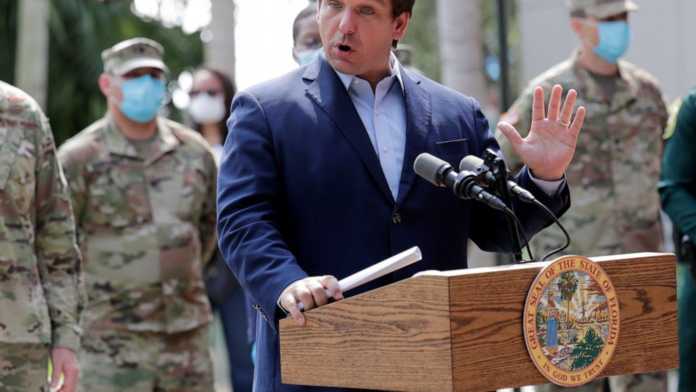
As unemployment shot up in the early weeks of the coronavirus outbreak in the U.S., Florida took longer than any other state to handle the many new claims, according to federal data. Florida has always been a tough place to be unemployed, and the economic downturn has made things even worse.
Now, Florida is scrambling to catch up with other large states and its neighbors in the South. An analysis by the Associated Press showed that nearly 7 out of every 8 Floridians who filed claims between mid-March and early April were still waiting for their claims to be processed, which was the worst rate in the country.
In contrast, other states like Texas and California, had already processed about one-third of their claims. New York, which had the highest number of coronavirus cases, had about 30% of its claims waiting, according to the analysis that looked at claims data sent to the federal government.
“If we had to guess which states would have the hardest time with their unemployment systems, Florida would definitely be at the top,” said Indivar Dutta-Gupta, a co-executive director at Georgetown University’s Center on Poverty and Inequality.
Since March 15, just before Governor Ron DeSantis limited service at restaurants and bars, about 650,000 Floridians filed initial claims for unemployment benefits. Many more seem to have had trouble submitting their applications.
An online dashboard that the Department of Economic Opportunity launched showed how far behind Florida is. It revealed that the state has paid benefits to barely 6% of those who filed claims and processed claims for less than a quarter of applicants since March 15.
With frustration growing, officials have struggled to explain why Florida is lagging.
“We need to get people paid,” DeSantis said during a press conference last week. “While we’ve made progress recently, we have an unprecedented number of claims that we need to work through.”
He later mentioned that over 33,600 unemployment checks had been sent to people who lost their jobs because of the coronavirus.
“Why is Florida having such a hard time processing so many claims? It’s because it was not prepared to handle this many,” said Susan Houseman, a researcher for the Upjohn Institute for Employment Research. “In fact, the state has been scaling back in recent years, so it is even less ready for this situation than other states.”
A spokesperson for DeSantis said that Florida’s problems are not worse than those in other states, but federal data suggests otherwise.
The latest numbers from the Department of Labor showed that Florida was paying unemployment claims for just 1.1% of its workforce, while California paid for 6.2%, Texas for 3.1%, New York for 7.6%, and Rhode Island had the highest at 11.9%. The analysis is based on the number of people receiving jobless benefits.
Nearby Georgia had an insured unemployment rate of 8.2%, while North Carolina had 5.6%. South Dakota had the second-worst record at 1.8%, and Arizona was next at 2.2%.
In good economic times, these numbers might indicate a strong job market, but in tough times, low rates show how hard it is for unemployed people to get the help they need.
Currently, people in Florida can receive aid for 12 weeks, which is tied with North Carolina for the shortest period in the country, though it can last up to 23 weeks depending on the unemployment rate. Most states offer benefits for up to 26 weeks. Florida’s maximum benefit of $275 per week is also one of the lowest in the nation, with only a few states paying less.
Even before the virus changed life for many Floridians—an estimated number that could rise to over 1 million—the state’s unemployment system had serious problems.
Soon after the online unemployment portal opened in October 2013, system crashes prevented people from claiming benefits. Many couldn’t even log in to the portal, which continues to be a common complaint. A state audit found many problems, and another audit done after DeSantis took office last year said many of those issues were still not fixed.
“The system was set up to fail. Why? Because it made it look like fewer people were filing for unemployment, even though many were struggling to apply and get benefits,” said state Senator Annette Taddeo, a Democrat from Miami, who has been getting many calls from people seeking help.
For many of the newly unemployed, like Luis Perulero, a 35-year-old father of four who worked for Delta Airlines, the situation is serious. Perulero was furloughed last month and needs his unemployment check.
“I have no idea where we’re at in the process, and we haven’t been able to get any answers,” Perulero said. His application is still pending, and he has called hundreds of times to get it moving.
With rent due, they have talked to their landlord. He and his wife also need to pay the $500 monthly premium for the health insurance that covers their four children.
“We’re trying to figure out how to make sure we have enough for groceries next month,” said his wife, Kaysa Rodrigues, whose income from her small payroll company has dropped because fewer businesses need her services.
Before the outbreak, Florida had a strong job market, with an unemployment rate of 2.8% in February.
“Unemployment insurance helps the job market when times are good, but now it’s hurting us as we go through this unusual recession,” said Sean Snaith, the director of the University of Central Florida’s Institute for Economic Forecasting.










